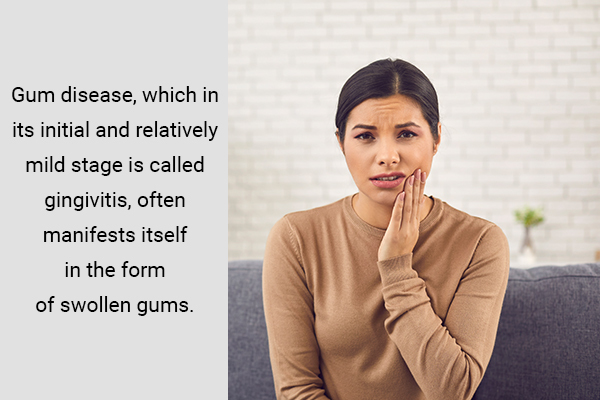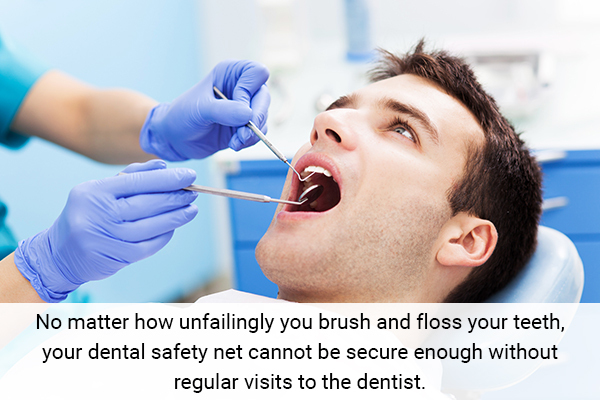In this article:
Gums or gingiva is the part of the oral cavity that surrounds the necks of the teeth and covers part of the bone of the upper and lower jaws.

Gingiva and the structures underneath such as the bone and the ligament form the foundation that supports our teeth. Thus, adequate gingival health is important.
Gingival swelling or gum swelling is an abnormal overgrowth of our gingiva. The tissue that forms the gums is thick, fibrous, and full of blood vessels. Hence, when there is swelling, the gums tend to protrude or bulge out and appear red instead of their normal pink.
Even though swelling of the gums is a common problem, it should be taken as a red flag indicative of some other serious condition at the base of it.
What Causes Gum Swelling?
Gum swelling can be due to a number of issues, such as:

- Gum disease, which in its initial and relatively mild stage is called gingivitis, often manifests itself in the form of swollen gums. Improper oral hygiene encourages the mouth bacteria to cover the teeth with a film of plaque, eventually leading to inflamed gums that appear red and swollen and are prone to bleeding. If left untreated gingivitis may progress to periodontitis, which is gum disease. Advance stages of periodontist are associated with mobility of teeth and eventually loss of teeth.
- People undergoing chemotherapy might experience swollen gums due to the development of sores and ulcers on the gums as well as throughout the mouth.
- Hormonal imbalances, particularly in women during puberty, pregnancy, menstruation, and menopause have also been associated with gingival inflammation which often manifests in the form of bleeding gums. The use of oral contraceptive pills tends to engender a similar effect.
- Excessive use of tobacco, either in the form of smoking or direct consumption of tobacco products, can be extremely damaging to your gum health and make you susceptible to a range of gum problems, from swollen gums to painful sores. Moreover, chewing tobacco is highly associated with oral cancer which may initially manifest as gum swelling, tissue changes, and sores.
- Incorrect or vigorous brushing or flossing techniques can also irritate and hamper your gums. Also using brushes with hard bristles can cause injury to your gums. (1)
- Allergic reactions to components of your toothpaste, food, medication, and other dental materials can lead to the problem of inflamed gums.
- A misaligned tooth can also poke and prick at the gums over a prolonged period and cause a flare-up in the gums.
- Not removing dentures and partials while going to sleep and improper cleaning of such appliances can cause gingival redness and swelling, as the gingival tissues don’t get any rest when appliances are worn 24*7.
- Other common causes include poorly fitting dentures or other dental appliances, nutritional deficiencies particularly of vitamin B and C, stress, sensitivity to toothpaste or mouthwash, and an injury. (2)
Signs and Symptoms of Gum Swelling
- The gums have dark pinkish, reddish, bluish, or purplish hues.
- The papilla between the teeth appears blunted or there is no papilla at all.
- The gums tend to bleed at the slightest application of pressure, for instance, while brushing or flossing.
- Pain in the gums that ranges from uncomfortable to mild.
- Mouth odor or halitosis is associated with gum disease.
Why Must You Get Dental Checkups Regularly?

No matter how unfailingly you brush and floss your teeth, your dental safety net cannot be secure enough without regular visits to the dentist. Oral health is usually not accorded the same importance as other prevalent health concerns.
As a result, most people tend to overlook the early symptoms of a dental problem, only to deal with the damage it causes later. You can save yourself a lot of trouble and pain by enlisting the help of a dentist to give your oral cavity a more thorough scan and cleaning.
The dentist will evaluate your dental and oral condition and will stipulate the necessary oral hygiene regime accordingly. If you figure among the high-risk patients, you may need to drop by the dentist more frequently for a timely assessment.
The recommended number of dental visits also relies on the discretion of your dentist, who will take into account all the necessary oral health markers such as plaque accumulation, dental cavities, gum swelling, and gingival bleeding before determining your need for professional cleaning and treatment.
Besides, people with a family history of gum disease are generally more vulnerable to periodontal disease and early tooth loss, which makes regular dental checkups all the more important.
Thus, besides the standard brushing and flossing, it will serve you well to follow another foundational rule in the oral hygiene book: get regular dental checkups by a professional to catch and reverse any sign of oral disease in its nascent stages!
You can soothe the pain and swelling of your gums with proper oral hygiene and home remedies. However, if you have swollen gums and symptoms persist for more than 2 weeks, see your dentist.
When to See a Doctor
If the swelling in your gums persists for more than two weeks, you should seek professional help right away to determine the cause of the problem and zero in on a suitable treatment plan.
Final Word
Oral health is usually not accorded the same importance as other prevalent health concerns. As a result, most people tend to overlook the early symptoms of a dental problem, only to deal with the damage it causes later.
You can save yourself a lot of trouble and pain by enlisting the help of a dentist to give your oral cavity a more thorough scan and cleaning.

- Was this article helpful?
- YES, THANKS!NOT REALLY



